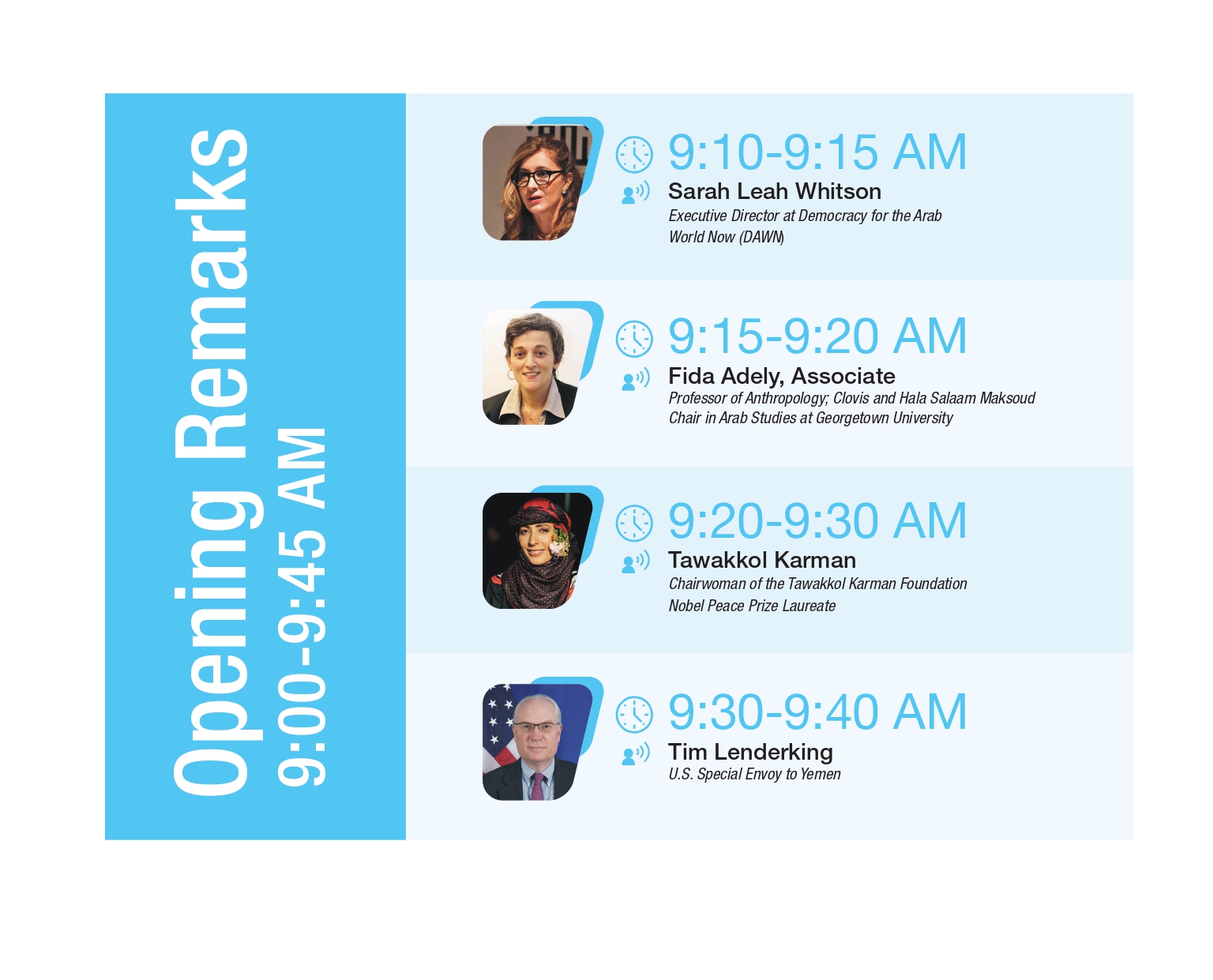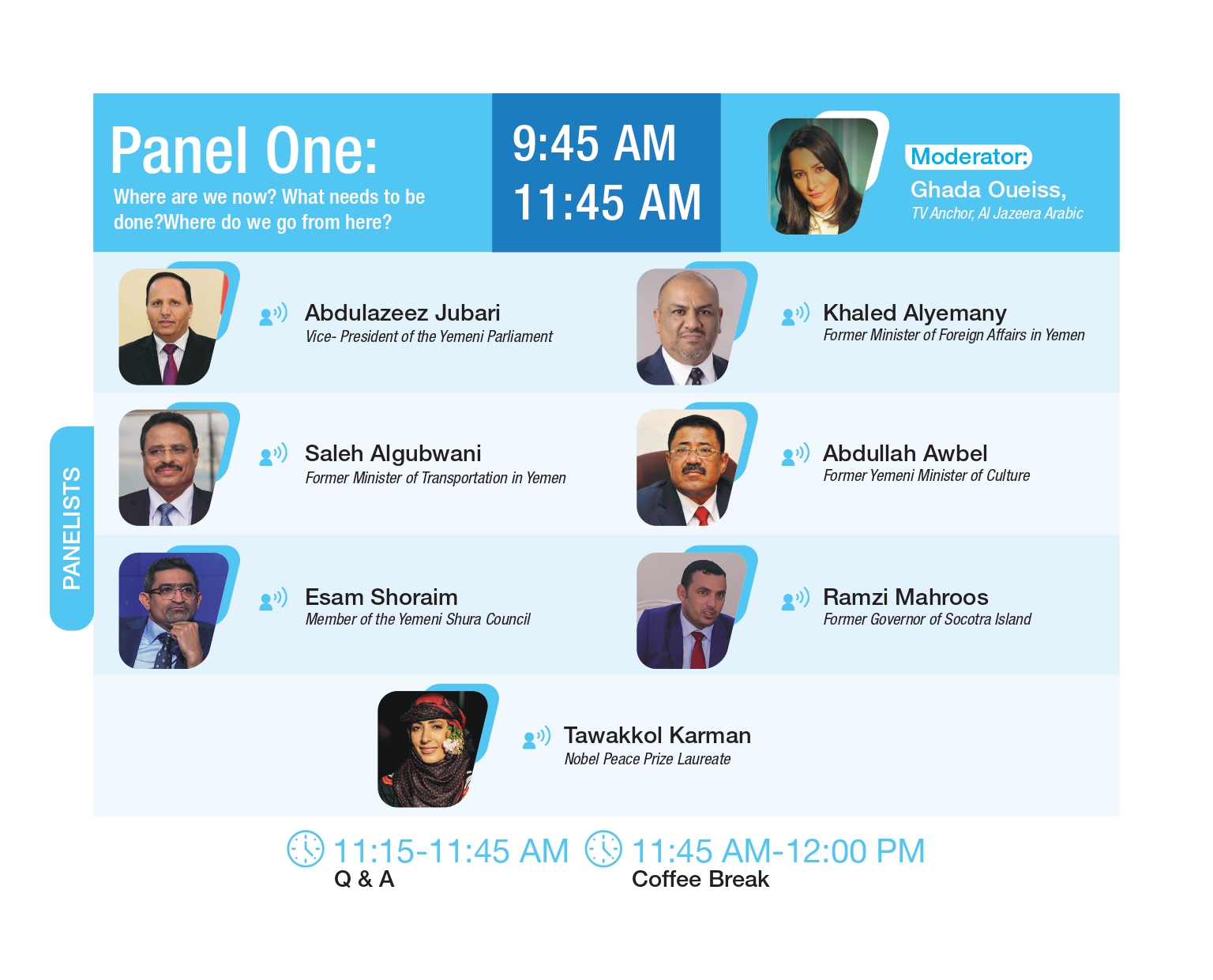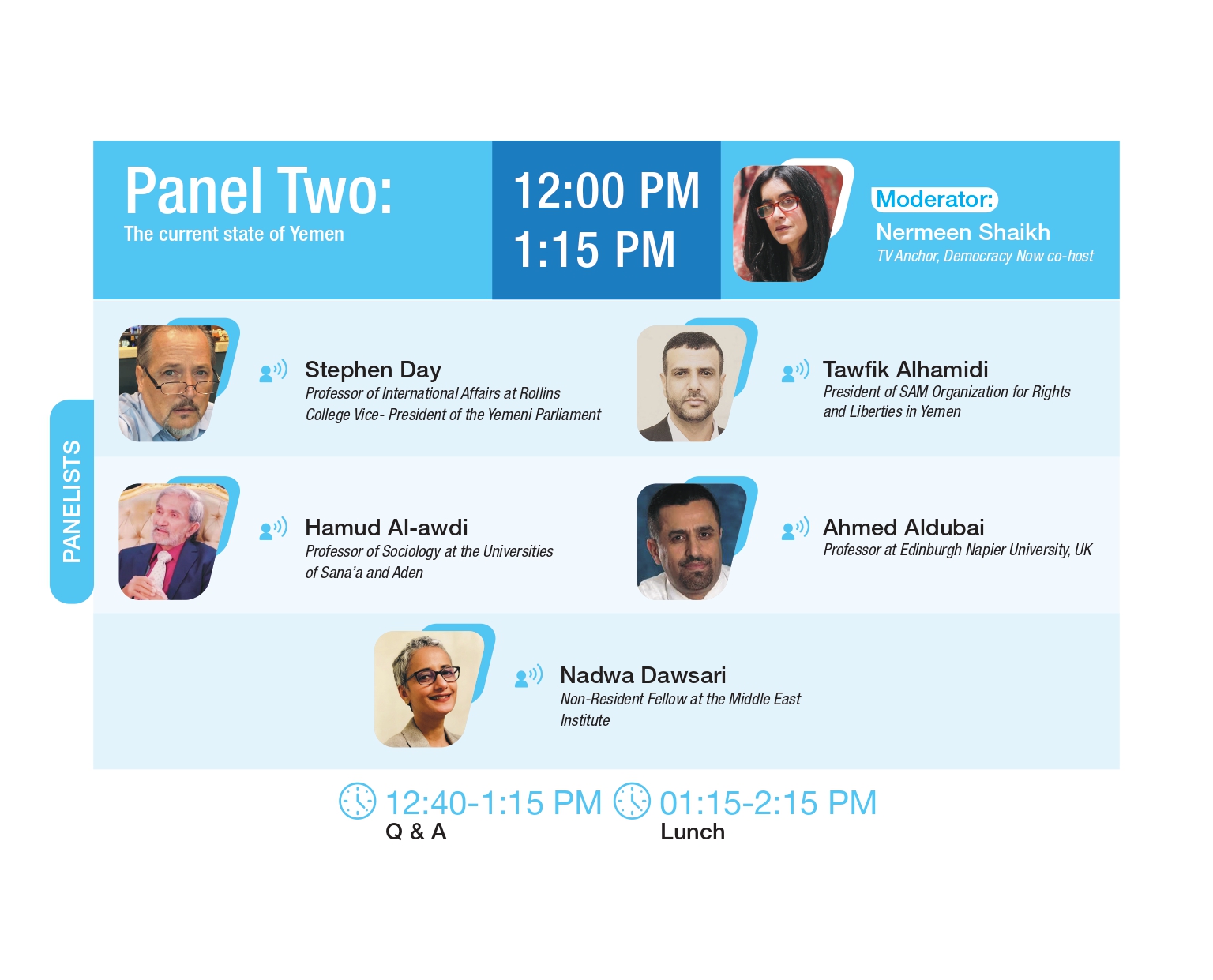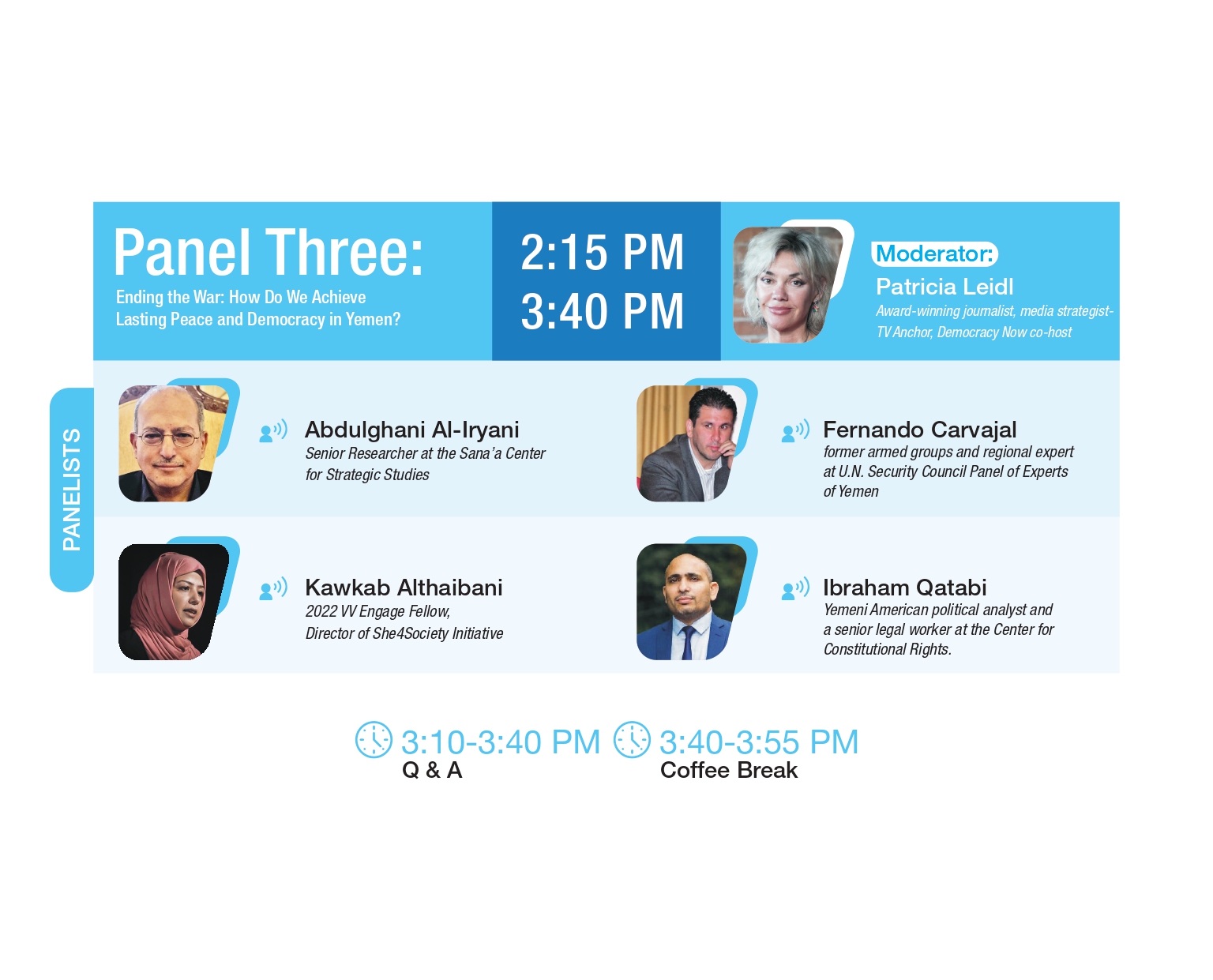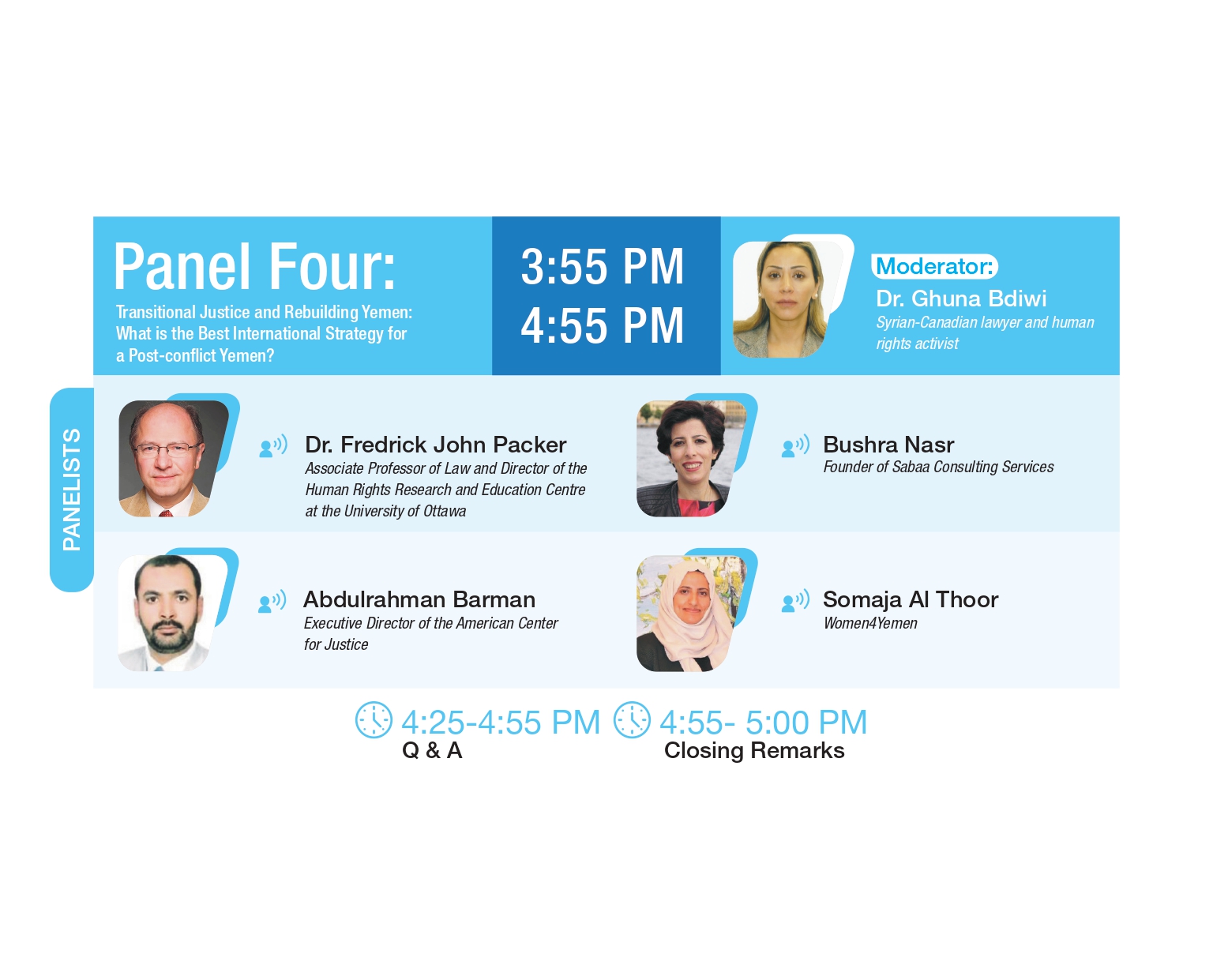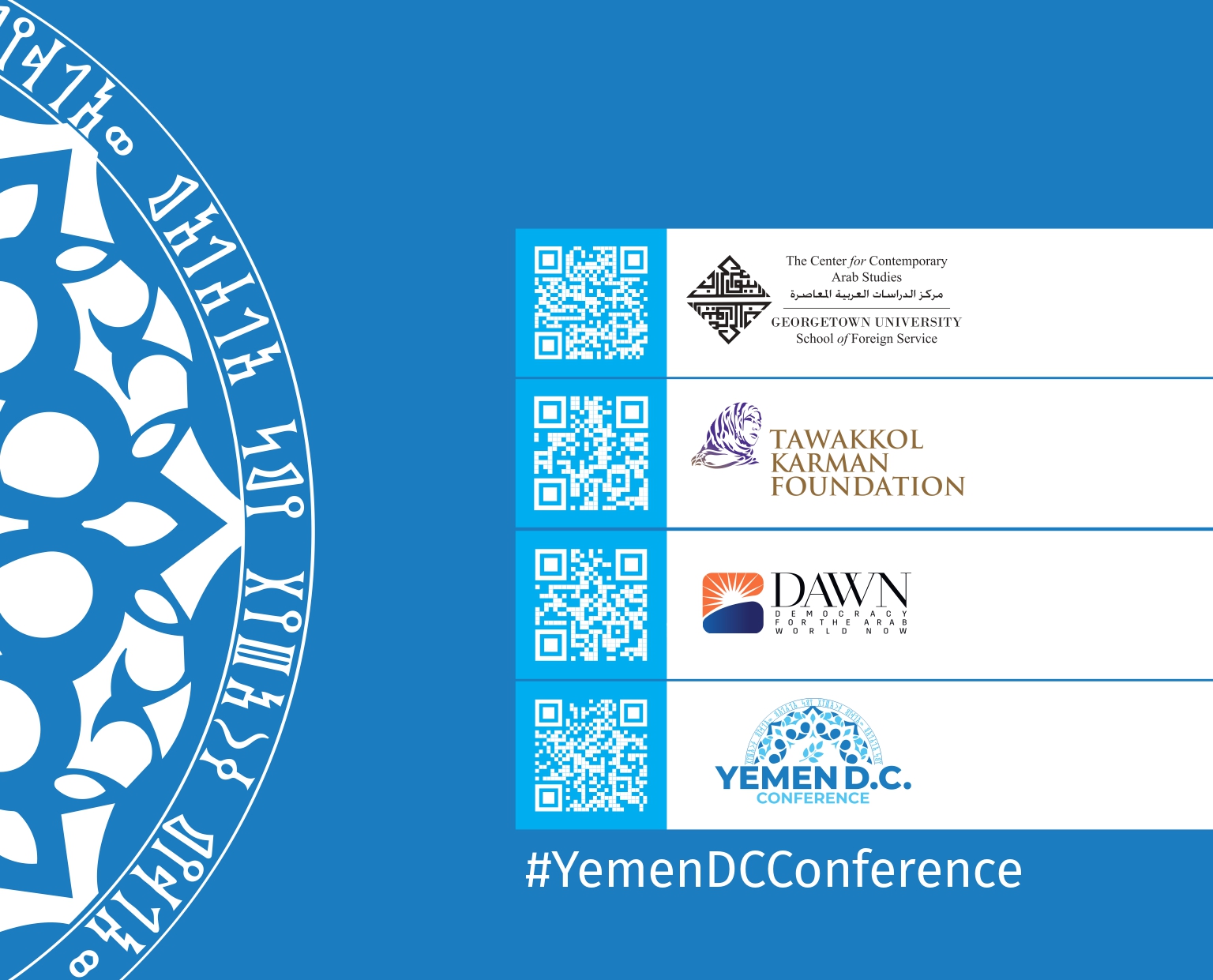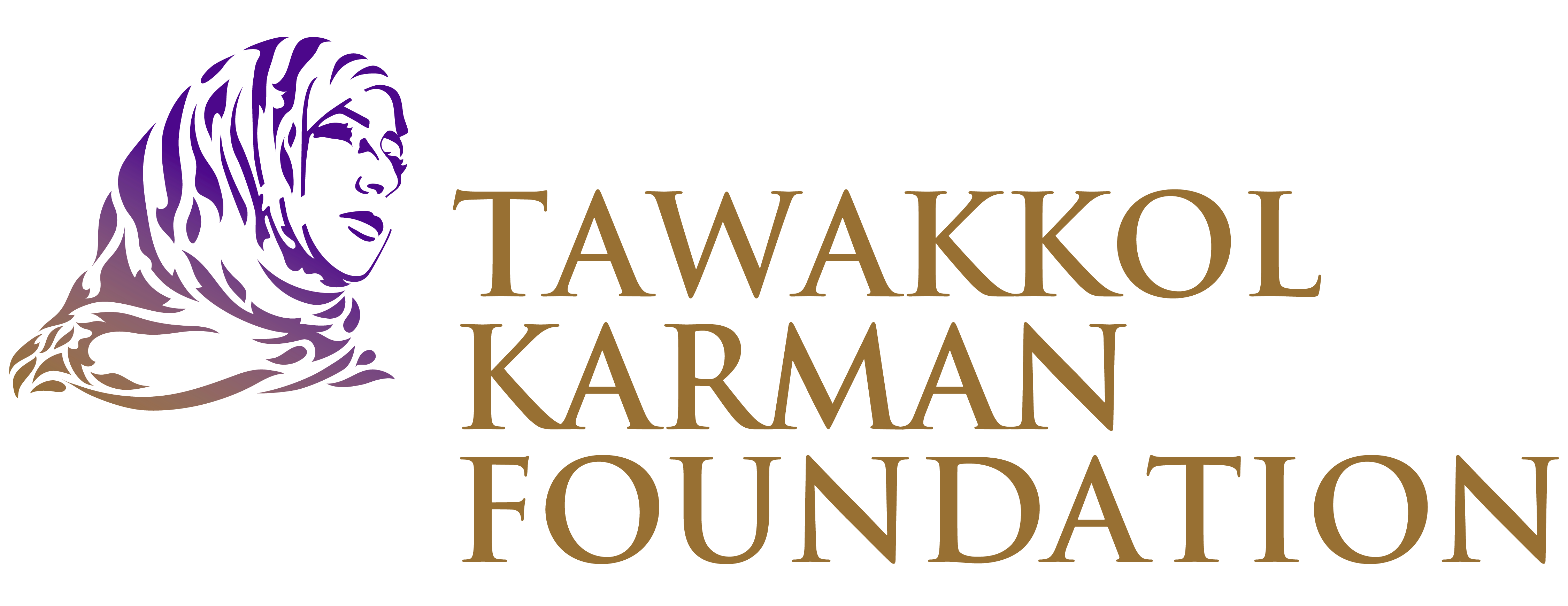Articles
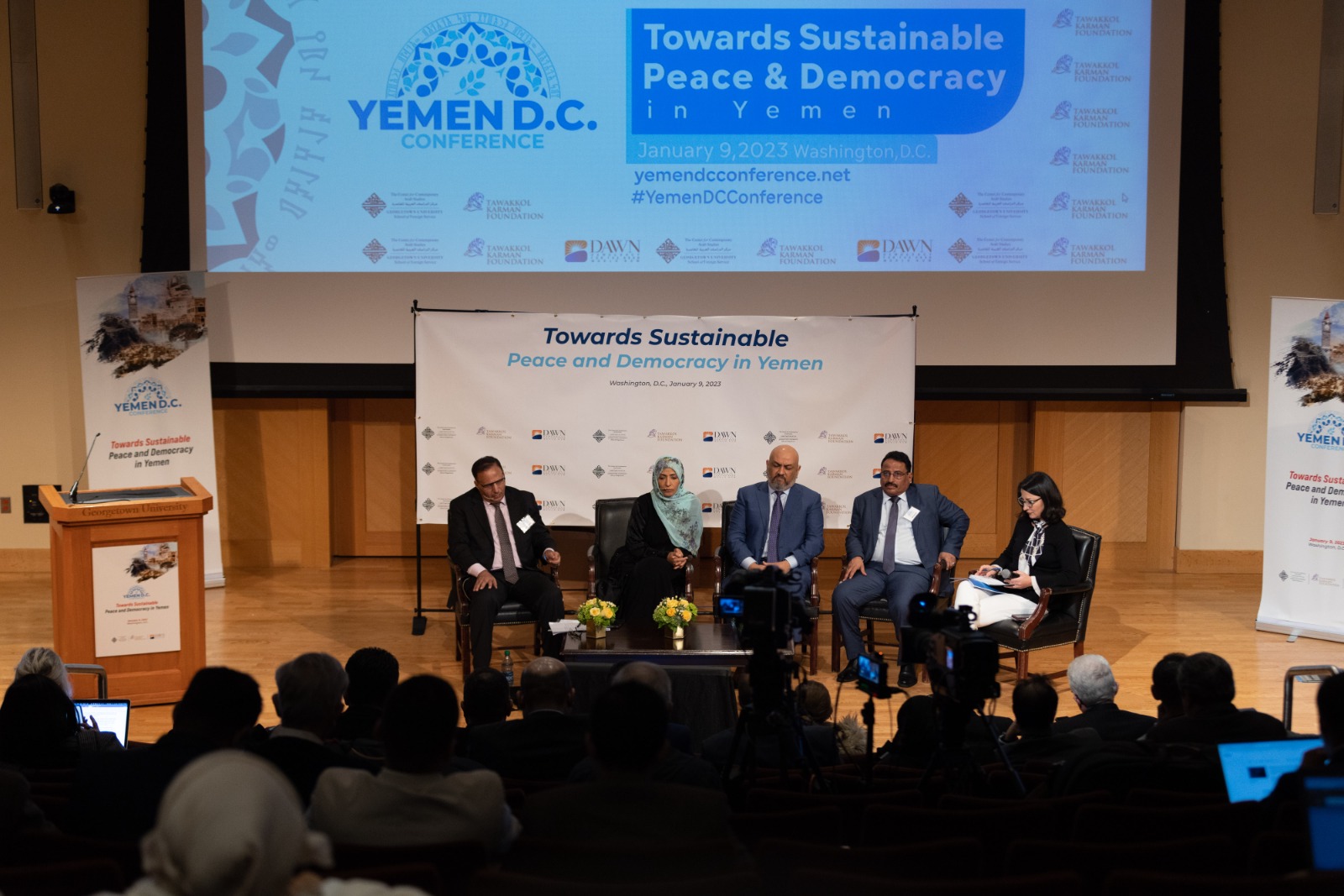
Yemen D.C. Conference: Towards Sustainable Peace and Democracy in Yemen
Opening Remarks
Sarah Leah Whitson
Given that the country is in a state of war and has been in a state of war for over eight years. After eight years of this war, this needless war, this senseless war, bombardment, and an ongoing blockade of the country that I must say, has been aided and abetted by my own government, people seem content to let the issue of Yemen and peace and democracy in Yemen to be solved in backdoors by foreign states and their appointed delegates purporting to represent Yemenis and purporting to govern Yemenis.
Our goal was to bring this discussion to Washington, where so much of what our policymakers decide impacts the lives of Yemeni men, women and children. Unfortunately, they do not have a vote. And they do not have a say in what our policymakers here in Washington decide. But our goal is, at least, to center the voices of Yemeni leaders and activists, so many of whom you will hear from today, who have committed a good part of their lives to democracy and rights in Yemen. We have with us, as I mentioned Tawakkol Karman, who really, it took her a minute to agree to partner with us in organizing this conference and has provided incredible resources and backing to have it together.
It has been a tremendous amount of work, as you can imagine, for an organization, the size of Dawn democracy for the Arab world now, which as some of you know, was founded by the late our beloved friend Jamal Khashoggi. And I should note that the chairman of our board, Nihad Awad, there he is. Thank you, Nihad for coming, and for your foresight and vision and helping create this organization. But we are a tiny team. And Abdullah Alawda, our gulf director, really deserves heroic congratulations for the months and months of work he has put into organizing this event and the tremendous amount of patience and grace that really only he, I think, could have carried out and carried forward to make this happen.
Of course, all the teams have done, as well as the Tawakkol Karman Foundation and Georgetown University, worked together to bring you here today. Our speakers have prepared papers that we will publish and publicize as we continue our efforts to further discussion and debate about a Yemeni-led process to address the catastrophe in the country. When I first started working on Yemen, well, before the uprising, well, before the revolution, it was because of Yemeni activists who came to my office in New York Human Rights Watch at the time, and said you have to work on Yemen, Human Rights Watch needs to work on Yemen. And we did, we started working on Yemen, we opened an office in Yemen. And we were excited to see the revolution in Yemen, a peaceful revolution, a remarkable revolution that ousted a dictator, who had ruthlessly governed the country for many decades.
It is a remarkable achievement today, still, for which Tawakkol has gotten obviously, great recognition. But all of the Yemeni people deserve support and recognition for what they managed to do, at tremendous risk to their lives to their survival, to create a new future for the country. And I think it speaks to the depths of Yemeni civil society, across the country, that they were able to come together to pull off this revolution peacefully, to establish a national dialogue process to establish the direction that they wanted their country to go in. Unfortunately, that process was upended with this war with the interference of foreign states, whose argument with Yemen has really little to do with Yemen and more to do with regional competition, regional control, regional influence. These are not the priorities of the Yemeni people, nor should they be ours. I hope that you will really take advantage of this opportunity to hear from the Yemeni speakers we have today, as well as experts, academics, journalists, who have worked to disclose and discover the abuses happening in their country, but most importantly, now working to ensure that the future direction of the country is centered on the rights of the Yemeni people, the freedom of the Yemeni people and the right that the Yemeni people have to democratic governance of their country. With that, I will introduce Professor Adely, who's a professor of anthropology and our partner here at Georgetown University. She chairs the Arabs Studies Center at Georgetown University.
Professor Fida Adely
Good morning! On behalf of the Center for Contemporary Arab Studies at Georgetown University, and the Tawakkol Karman Foundation and the Democracy for the Arab World Now, DAWN, I would like to welcome our guests and participants to this important event. We have a distinguished lineup of speakers today, including Tawakkol Karman, Nobel Peace Prize Laureate; Sarah Leah Whitson, who you've just heard from, Executive Director of Dawn; Abdulaziz Guberi, Vice President of the Yemeni Parliament; Khaled Al-Yamani, former Yemeni Minister of Foreign Affairs and UN ambassador; and Salah AlJabwani, former Yemeni Minister of Transportation; as well as many other distinguished speakers that we will have the privilege of hearing from today.
It is unfortunate that it is a political and humanitarian crisis that brings us here today, and we must begin by acknowledging the weight of this. After more than eight years of war, Yemen has experienced widespread destruction and an unprecedented humanitarian crisis. According to the United Nations Office for the Coordination of Humanitarian Affairs, the war has caused the deaths of nearly a quarter of a million people, including many civilians, among them 1000s of children. The UN and Human Rights Watch have also recently reported on the killing and abuse of migrants and asylum seekers by parties to the conflict. While many of these deaths have been the result of direct violence, others are indirect and a product of a man-made humanitarian crisis created by the parties to the conflict. This crisis has been significantly exacerbated by an ongoing naval blockade imposed on Yemen by a Saudi-led coalition. In July of this year, the World Food Programme estimated that almost one in three Yemenis, 19 million people were food insecure, with 3.5 million acutely malnutritioned.
Human Rights workers on the ground as Sarah has just attested to, on the ground in Yemen as well as abroad as well as the UN and international human rights organizations, have worked diligently throughout this period to document the tremendous human rights violations and repeated violations of international law that this conflict has witnessed, including the deliberate targeting of civilians committed by all parties to the conflict. In April 2022, to a limited true saw a reduction in the intensity of fighting in most parts of the country and small gains in humanitarian assistance, though the blockade remains. While the truce is fragile, and there have been repeated violations of the truce, overall civilian deaths have decreased and some space for movement and goods and people have opened up. While a continuation of the truce is possible, the potential for a return to full hostilities remains and the ongoing violations means that ravages of war continued to be felt, including significant human rights violations such as imprisonment, torture, and attacks on journalists. What recent conflicts have made abundantly clear to all of us is that these wars and their effects are not contained locally, nor are they produced locally.
Sitting here in Washington DC. It also behooves us to acknowledge that the United States has also been party to this conflict, and has significant leverage over many of the key actors engaged. As such, it has a moral responsibility to actively work towards its end. Today's conference brings together Yemeni leaders and scholars, journalists and human rights activists from Yemen and beyond to think productively about a way forward. The Center for Contemporary Arab Studies was asked to host this event and reflects a type of engagement with knowledge producers, policymakers and activists in the Arab world that we are committed to. One that centers the expertise and experiences of those most directly impacted by the conflict, as well as researchers who center their experiences. It is our hope that today's deliberations can help lay a foundation upon which a brighter future for Yemen can be built. Thank you very much and welcome again to Georgetown University. And I will now pass along the microphone to Tawakkol Karman, Nobel Peace laureate.
Tawakkol Karman
Dear Friends,
Greetings to you, dear friends and colleagues participating in the Washington Conference "Towards Sustainable Peace and Democracy in Yemen"
Allow me to welcome you all, and all protocols observed.
I would like to thank Center for Contemporary Arab Studies at Georgetown University, and the Dawn Organization for partnering with us in organizing this important conference.
We meet here today to raise our voices for peace and democracy in Yemen and to express the suffering of our people who are entering their ninth year of the coup and the devastating war being waged against them internally and externally.
We meet today to raise our voices in an appeal to the world to save the Yemenis who have been living without a state for eight years, and who suffer from a daily threat to their lives in extremely bad conditions, where the war has claimed tens of thousands of lives, thrown millions of lives into the displacement, and pushed Yemen to famine, embodying the worst humanitarian crisis in the world today.
The entire Yemeni people suffer from the coup and the war together live daily humiliation from the Iranian-backed Houthi militia that turned against the state and committed crimes against humanity and lives daily terrorism from the war, and Saudi-Emirati tutelage and occupation that declared war on Yemen under the false pretext of restoring legitimate government, whereas it caused massive destruction, and added more militias to the already existing militias, and went far in fragmenting and tearing the country apart. This is the real agenda of the Saudi-Emirati coalition war in Yemen.
I regret to say that continuing the present approaches to the Yemeni file by the United Nations and the major powers makes peace unattainable. The error of the international approach to the Yemeni crisis is visible. Any observer of the efforts of the international community, the major countries, and the UN envoy during the years of war can come to a simple conclusion that the essence of these trends is in the direction of leaving Yemen entirely to the Houthi militia on the one hand, and the Saudi-Emirati coalition on the other.
The result is that the major powers, the United States and Britain in particular, have implicitly or explicitly supported the continuation of Saudi Arabia and the UAE in the war on Yemen, its destruction, the occupation of its land, and its fragmentation in that horrific way, and the continuation of the Iranian-backed Houthi coup at the same time. This is unacceptable and incomprehensible support for keeping the Yemeni people under the mill of war, coup, tutelage, death, siege, destruction, the collapse of services, suspension of salaries, the spread of famine, oppression, and humiliation under which Yemeni cities and their militia-ruled populations suffer, from Sana’a to Aden and most cities and population centers in cities and rural areas.
The war in Yemen must stop, and we must put an end to this absurdity, this tragedy, this bloody coup, this disastrous war, and the war criminals. But how will this war end? How will we build sustainable peace and democracy in Yemen?
It is important to define the concept of the end of the war, and what are the conditions when we say that the war is over in Yemen and that we have to start with the challenges of the next day.
Defining the concept of ending the war is very important so that those who tampered with and violated Yemen during the eight years of war do not surprise us with agreements dressed as peace and prepared by the conflicting external forces in Yemen and their proxies at home, through which they complete the achievement of their goals of the war, and legitimize the division of Yemen and the status of the militia states as a fait accompli l!!
The Iran-backed Houthi militia, which started the war and turned against the state, will not end the war except after imposing its control by force and imposing its complete dominance over the country's resources, wealth, and educational and judicial institutions. And subjecting society to its supremacist, RACEST ideology. Houthis is a movement that does not show any flexibility to accept a political settlement in which it is a component within the components and a political group that recognizes the state as a reference for all the forces of society.
For Saudi Arabia and UAE, war is over if it can reflect its management of the Yemeni war in agreements that bless its occupation and tutelage over Yemen where there is no state, let alone its interests in plundering Yemen's wealth and controlling Yemen's geostrategic position of great importance, they want to divid Yemen to achieve their goals divided and chaotic and in a state rupture and small internal strife.
All the closures we have reviewed do not end the war, rather they provide it with more fuel and prolong its tragedy.
The war does not end with deals between the internal warlords and the occupying and external tutelage countries.
What a closure to the war in Yemen, if it was torn apart into mini-states run by militias affiliated with Iran, Saudi Arabia, and the UAE?
What a closure to the war if we go to agreements that legitimize chaos and acknowledge the statelessness and the end of the republic and unity and the outcomes of the National Dialogue Conference, the draft constitution, and the project of the federal state and regions?
These questions are neither a luxury nor an adherence to a war. We are the first to reject and warn against it.
Continuing the tutelage over Yemen is a continuous declaration of war.
Keeping the militias as mini-states within the state is a war, no sane person can deny that. Militia, after all, live to steal and kill.
We believe, that the war in Yemen will end with the restoration of the hijacked Yemeni decision in Riyadh, Abu Dhabi, and Iran.
The war will end with the integrity of Yemen, not with its fragmentation, with the restoration of the state of the Republic of Yemen, which has complete sovereignty and authority over all Yemeni territory, from Sa’da to Al-Mahra, from Sana’a to Seiyun, from Socotra to Aden, and Bab al-Mandab, and every inch of Yemeni land
Any peace agreement mustn’t harm the unity of the Yemeni state or surrender its sovereignty. Likewise, any peace agreement should lead to the cessation of the warlords’ intervention, the disarmament of militias, an end to divisions and the multiplicity of de facto authorities, and an end to daily violence exercised against the civilians, clearing mines, releasing detainees, and lifting the internal and external siege, and ending all forms of Saudi and Emirati interference and tutelage.
to building an inclusive Yemeni government in which all Yemenis participate, and which is responsible for withdrawing militia weapons, moving forward with a referendum on the draft constitution, and holding various elections based on the constitution, and to a transitional justice that will do justice to the victims and ensure non-recurrence.
Respecting Yemen as an independent, one, unified and sovereign state, compensating it for all damages, and rebuilding it.
This is the only path leading to sustainable peace and democracy in Yemen, otherwise, it is nothing but a prolongation of the war and an increase in people's suffering.
Finally, we realize how great our suffering is, and we realize that one of the most important reasons for its continuation is the lack of a national authority that considers the interests of the Yemenis its main concern. We realize that there is abandonment by some, and greed among others, but Yemen is used to making great surprises, we are confident about our people. All we ask is to help us overcome these difficult circumstances, and with the will of our people and our faith in Yemen, we will turn the page of war and start a new history, which they see far away and we see soon.
I can almost hear that call from everywhere in Yemen: The Yemeni people are not broken, and Yemen is hard to swallow.....
Thank you very much....
Allow me here to introduce the American envoy to Yemen Mr Tim Lenderking, Thnak you first for being with us, and we would like to hear your vision on how this war can end, and ways to establish sustainable peace and democracy in Yemen, welcome Mr. Tim, the floor is yours..
US Envoy Timothy Lenderking
Good morning. Sabah Alkhair. Alsaalam alaikum. It's a great pleasure to be with you this morning. Thank you very much for this opportunity to speak to so many of you here in the audience and those of you online. I'd like to thank the co-hosts for organizing this terrific event today: the Center for Contemporary Arab Studies at Georgetown University, Democracy for the Arab World Now, and Tawakkol Karman Foundation. I especially look forward to hearing the conclusions of today's conference, particularly proposed solutions to end the war once and for all. And that can lead to the withdrawal of foreign forces from Yemen. I'm pleased to share the podium this morning with Sara Leah Whitson and Professor Hadley and Tawakkol Karman and others.
… unable to buy basic goods, feed their children, or access basic care. Only a comprehensive Yemeni-Yemeni political agreement and recovery process can begin to repair these institutions and rebuild Yemen's economy. Through consistent intensive engagement, the United States has helped mobilize a strong international and regional consensus around peace efforts under the auspices of the UN. And I sincerely hope that today's event will continue to inform that process. We continue to see proactive constructive efforts by the Sultanate of Oman, which has played a critical role in peace efforts. We also continue to see a commitment from Saudi Arabia to help end the war, and that helped enable an unprecedented period of calm in 2022. Because of these collective efforts and commitment from the region and the international community to bolster UN peace led efforts in Yemen, the United States believes that 2023--this year-- ladies and gentlemen, brings new opportunities to end the conflict once and for all. And we must take advantage of these to truly end this terrible conflict. Yemenis deserve a prosperous future, and we remain committed to supporting Yemeni efforts to shape a brighter future.
While many observers seek to present easy solutions to the conflict in Yemen, the reality is that the situation is complex, and meaningful diplomatic solutions take time. As many of you know better than I do: the roots of the war stemmed from the disruption of Yemen's peaceful transition process in 2014. The tensions and challenges that process sought to resolve have only continued to fester over eight years of war. That includes fundamental questions like the status of Southern Yemen, which Yemenis can and should decide for themselves. The UN led six month truce from April to October 2022 and the period of relative calm that has continued even after the formal expiration of the truce provide a valuable opportunity. First cross border attacks have stopped, including zero coalition airstrikes since March 2022. Second, civilian casualties from the fighting have dropped dramatically, even as casualties from landmines and other remnants of war remain a major issue that must not be ignored or forgotten. Third, fuel is flowing more freely into Northern Yemen. And last, commercial flights are continuing from Sanaa airport. More than 40,000 Yemenis have been able to take advantage of these flights for family reunification, for medical care outside of Yemen. These flights have saved lives. I've just pointed the four benefits that have helped ease the suffering of Yemenis since March 2022. They're not enough, but they do represent a start. And for that reason, we urge the Yemeni parties to take advantage of this opportunity. Build on these benefits by starting political talks under UN auspices to resolve this conflict.
The United States understands the party's focus on economic measures. We agree that the economic crisis across the country is a main driver of the humanitarian crisis. We agree that urgent efforts are needed to ease this economic crisis and stitch Yemen's institutions back together. But the reality is that this can only be accomplished as part of an inclusive Yemeni led political process. The Houthis have focused their latest demands on paying public sector salaries using Yemen's hydrocarbon revenues. These public sector salaries are a lifeline for many Yemenis. But it was the Houthis’ escalation of these demands, and only these demands that prevented a formal extension of the truce in October. A truce extension that would have expanded the benefits beyond public sector salaries. While at different times, many parties have exacerbated the economic crisis, more recently, multiple Houthi attacks against Yemeni ports and international shipping in recent months have grounded oil export revenues to a halt. This halt in oil export revenues has deprived millions of Yemenis of resources that were used to pay civil servants salaries and provide basic services. All this while other hydrocarbon exports have been paused for years.
Dialogue is the only way to resolve this issue. There is no military solution to the Yemen conflict. And there is no benefit that can come from a return to military hostilities by any party. Only by sitting down with other Yemeni parties can Yemenis reach a solution to pay civilians salaries and start getting money in the hands of families across the country. The Yemen government has formed its own negotiating team. The Houthi so far have refused to sit down with them. We urge the Houthis to change this approach: choose peace. The world is watching their and the other party's actions and inaction. We know these kinds of political and economic discussions will be difficult, including for Yemenis in the southern governorates home to most of these hydrocarbon resources. But only by tackling these issues can there be hope to reach a durable resolution that stops the fighting and reverses the economic crisis in Yemen. To some, an inclusive political process between the Yemeni parties is a critical first step. But durable peace and recovery require much more. A peace process must incorporate Yemenis calls for justice and accountability, for human rights violations and abuses along with efforts to repair the deep divisions within Yemeni society. A recovery process will need to follow and Yemen will require a major recovery effort that is supported by the international community and carefully managed and coordinated with the peace process. This recovery process must lay the foundation for the kind of expanded economic cooperation between Yemen and the region that will enable sustainable growth and prosperity. All of these efforts must be inclusive and incorporate voices from across the country, including from women and marginalized groups. Although it will take time, a comprehensive peace and recovery process is essential for the people of Yemen, the youngest of whom have only known war. The United States remains committed to working closely with our partners in the region, the Yemeni people and beyond to support this process, and to support Yemenis as they determine a brighter future for their country. Thank you very much.
Panel One
Where are we now? What needs to be done? Where do we go from here?
Panel Two
The Current State of Yemen
Panel Three
Ending the War: How Do We Achieve Lasting Peace and Democracy in Yemen?
Panel Four
Transitional Justice and Rebuilding Yemen
Final Statement
Yemen D.C. Conference Communique
In an atmosphere of a high sense of responsibility for what Yemen is suffering from the tragedy of the horrific war which is on the verge of its eighth year, leaving behind more than half a million dead, wounded, disabled, and injured, and in light of the military and political impasse and noting that the role of the region and the international community is limited to opening an airport here or a port there while there are four million displaced people depend on humanitarian aid and twenty million live below the poverty line and the comprehensive destruction of the infrastructure. And in addition to that, Houthi’s intransigence, failure to renew the truce, and threatening to revert to war option. Furthermore, the deviation of the Arab Coalition from its role and original mission, into building militias and cantons in the country, and transforming faction leaders into state leaders.
Within this context, comes our meeting in Washington, with the participation of friends at the Institute of Contemporary Arab Studies at Georgetown University, Tawakkol Karman Foundation, and the Democracy in the Arab World Now (DWAN) organization, in the presence of the US envoy to Yemen, Timothy Lenderking.
We, the participants in the "Towards Sustainable Peace and Democracy in Yemen" conference, which was held at Georgetown University in Washington on the 9th of December 2023, express our appreciation for holding this meeting, which allowed us to discuss the political and humanitarian situation in Yemen with openness and freedom, and we express our deep thanks to those who facilitated the holding of this meeting and took part in it among brothers and friends and expressed their solidarity with the Yemeni people who have been suffering from extremely bad conditions for nearly eight years.
We, the participants, affirm that reaching genuine peace requires the fulfillment of the following commitments by the local parties involved in this war and by the region, the forefront of which is the Arab Coalition and the international community, which are as follows:
- Adherence to the unity of Yemen and the republican regime without abandoning sovereignty or the project of a federal, civil, and democratic state, as stated in the outcomes of the National Dialogue Conference, and we salute the efforts of the international community in support of this right as stipulated in the resolutions of the UN Security Council.
- We stress the urgent need to convene a Yemeni national conference that includes all Yemeni factions to produce a new Yemeni leadership that expresses the interests of the Yemeni people with mechanisms consistent with the spirit of the Yemeni constitution and with a comprehensive national consensus to lead the next stage to start peace negotiations, in the quest to build a federal, civil, democratic state that is governed by law and establishes human rights, justice and equality as the basis of its existence, and calls on the international community to support this endeavor noting that the current leadership and the mechanisms that were followed have brought the peace efforts undertaken by the UN and UN envoys to almost a dead end.
- We call on the Houthis to comply with the requirements of comprehensive, sustainable peace, based on the foundations that were set out in the draft federal-state proposal. And establishing a federal, civil, democratic state that takes care of the interests of all Yemenis from Al-Mahra to Sa’da and guarantees equal partnership for all Yemenis in power and wealth. Within this context, Houthi approval to stop the war and engage in serious negotiations will be the shortest way to stop the fighting and war, lead to peace, and block the attempts to tear and fragment Yemen.
- Withdrawing the militia's weapons and enrolling all forces within the Ministries of Defense and Interior structure is the best roadmap to get out of this fragmentation that will hinder peace.
- The State shall have the exclusive right to own weapons, and no political, sectarian, regional, or tribal party has the right to possess weapons to threaten the state and strike its entity and the rules and foundations of its continuation.
- Any future political settlement in Yemen must be based on what has been agreed upon in the outcomes of the National Dialogue Conference that produced the draft constitution for the federal state before it was undermined by the coup and war. And that the political process shall include all Yemenis without exception because abandoning the outcomes of the National Dialogue that the Yemenis agreed upon, means returning to the factors and causes that produced the wars that tore Yemen apart for decades.
- Ensuring a clear path for transitional justice is one of the ways to eliminate the causes of war reproduction and the factors of disintegration that have eroded Yemen for decades.
- We stress the need for the call for peace to be accompanied by the call for an international conference for the reconstruction of Yemen and the completion of the two tracks simultaneously, as peace has urgent economic requirements that will lift the Yemenis from the ravages of hunger and poverty and rebuild what was destroyed by the war.
- Release all abductees and prisoners, compensate and rehabilitate them from all sides, and close all prisons and detention centers.
- Lifting of all forms of sieges on the Republic of Yemen, internally between the cities imposed by the militia and externally imposed by the UAE and Saudi Arabia, including lifting the ban on exporting gas and oil derivatives.
- The need to pay public servants’ salaries
- The need for all foreign forces to leave Yemen and to hand over ports, islands, and military bases to Yemenis.
At the conclusion of the conference, we salute the struggles of Yemeni women, youth, students, and all other Yemeni groups for their keenness and effective contributions to get out of the devastating war to a comprehensive peace, and salute their steadfastness and patience for the hardships and challenges they endured as a result of the war and its bitter results.
Washington Conference calls for consensus within new Yemeni leadership, demands Houthis comply with requirements of comprehensive peace, and places emphasis on Yemen’s unity and the implementation of a republican system of governance.
(Comprehensive report on the conference and speeches)
Entitled “Towards sustainable Peace and Democracy in Yemen”, the Washington conference’s closing statement underlined the importance of maintaining the territorial unity and sovereignty of the Yemeni state and the implementation of a republican system of governance.
The statement stressed the urgent need to convene a national conference that will bring together all Yemeni factions in order to build a new state leadership that reflects the interests of the Yemeni people and is consistent with the spirit of the Yemeni constitution. It also urged the Houthis to comply with the aspirations and hopes of all Yemenis for a comprehensive and sustainable peace. The disarmament of militias and the consolidation of all armed forces under the control of the Ministry of Defense and Interior are the best mechanisms to end the current state of fragmentation that has served as a barrier to peace.
The statement called for an international conference of Yemen’s reconstruction, the release of all abductees, and the end of the internal (imposed by the Houthis) and external (imposed by the UAE and Saudi Arabia) blockade on the Republic of Yemen, including the ban on the exporting of gas and oil.
In the statement, emphasis was also placed on the need for all foreign troops to leave Yemen and hand over the control of ports, islands, and foreign military bases to the Yemeni state. Moreover, there is an urgent need to remedy the deteriorating economic situation within Yemen in order to combat hunger and poverty and provide a foundation upon which the country can be rebuilt. A Houthi acceptance of a cease-fire and their engagement in serious negotiations is necessary for the realization of such objectives.
The Yemen Conference in Washington was launched with the participation of Yemeni politicians and activists as well as Western researchers and officials. Organized by the Center for Contemporary Arab Studies at Georgetown University, and Tawakkol Karman Foundation, and the Democracy for the Arab World Now (DAWN), the conference discussed the current state of war in Yemen, how to bring an end to the conflict, the role of the international community, and how to achieve lasting justice and peace in Yemen.
In his opening speech, U.S. envoy to Yemen Timothy <Lenderking stated that Washington believes 2023 will bring an opportunity to end the conflict once and for all. He stressed his devotion to finding a solution to the crisis, explaining that President Joe Biden is committed to the same goal. “Dialogue is the only way to resolve this issue,” Lenderking stated, adding that “there is no military solution to the Yemen conflict and there is no benefit that can come from a return to military hostilities by any party. Only by sitting down with other Yemeni parties can Yemenis reach a solution to pay civilian salaries and start getting money in the hands of families across the country."
Lenderking also spoke of the Houthis ”The Houthi attacks against Yemeni ports and international shipping in recent months have grounded oil export revenues to a halt. This halt in oil export revenues has deprived millions of Yemenis of resources that were used to pay civil servants salaries and provide basic services. All this while other hydrocarbon exports have been paused for years”..
He explained that the United States remains committed to working closely with partners in the region and the Yemini people to support the peace process and the efforts toward a brighter future for Yemen.”
Nobel Peace laureate Tawakkol Karman also addressed the conference, stating, "the errors of the international approach to the Yemeni crisis are clear," adding that “any observer of the efforts of the international community and the U.N. envoy over the past eight years of war will see that their efforts trend in the direction of leaving Yemen entirely to the will of the Houthi militia on one hand and the Saudi-Emirati coalition on the other.” She explained that “any peace agreement must not harm the unity of the Yemeni state or undermine its sovereignty,” adding that “any peace agreement should lead to the cessation of warlord politics, the disarmament of militias, an end to divisions and the multiplicity of de facto authorities, lifting the internal and external siege strangling the country, and ending all forms of Saudi and Emirati interference and tutelage in Yemen.”
Deputy Speaker of the House of Representatives in Yemen, Abdulaziz Jubari, echoed these sentiments, arguing that “the Houthis are currently waging a war on the basis that they have a divine right to rule Yemen," while Saudi Arabia and the UAE are working to fragment Yemen via various militias in accordance with their own interests. Jubari added that in order to reach peace, the Houthis and other militias must be obligated to “transform into political parties under the umbrella of the Republic of Yemen, give up arms, and comply with the popular will.” He called for holding a national dialogue and the participation of all political parties and forces in order to decide the fate of Yemen and free the country from external interference.
The former Minister of Transportation, Saleh al-Jabwani, expanded on these points, arguing that the war between the Houthis, Saudi Arabia, and the UAE has effectively ended, and that the current mission of the Saudi-UAE coalition is to transform Yemen by carving out their own respective spheres of influence, particularly within the south. He called for the legitimacy of Yemen to be reshaped by convening a national conference where a national leadership from all walks of political life are chosen.
Ambassador <>Khaled Al-Yamani - the former foreign minister - explained that the Houthis always claim to defend sovereignty, while in fact they themselves are the one who have violated it because they have no constitutional legitimacy.
“The Houthis draw increasing gains thanks to the weakness of their political opponents”, Al-Yamani believed, adding that this is what makes the Iran-backed militias think they are about to achieve an important breakthrough represented by being recognized by the coalition in light of the ongoing dialogue through Omani mediation.
He also stressed that the Yemeni presidency council has not accomplished what justifies taking about “the post-President Hadi era”, citing that there are no institutional reforms nor stability for state institutions within the Yemeni territories.
The former governor of Socotra, Ramzi Mahrous, touched (via zoom technology from Muscat), about the systematical destruction against the island's distinctive environment rich in biodiversity, as well as against its own culture, as a result of exporting crises and problems to the island from outside the archipelago.
Mahrous indicated that the Yemenis are looking forward to a durable peace that preserves Yemen's sovereignty, unity and territorial integrity, stressing that this can be achieved only through the extension of the State’s control, equal partnership and citizenship and transitional justice.
"The Houthis only wish to end this war victoriously, so the saying "either everything or nothing" applies to them. Therefore, we hope that all the forces of legitimacy will unite so that they can be something the Houthi reckon with,” said the former Minister of Culture, Abdullah Obel, via Zoom technology from Aden Governorate.
The war, he noted, has drawn a map for a fragmented Yemen, which corresponds to the desire of the de facto authorities that were formed in the context of the war with the help of the Saudi-Emirati coalition on the pretext of fighting the Houthis.
In the same context, he called for the need for investigation into the violations committed by the previous regime, as well as into the violations done during the ongoing war by all parties.
In his view, there is no way to eliminate all roots of conflict and except through a transitional justice law and a law of recovering looted funds.
Dr. Hammoud Al-Awdi, a professor of sociology at the Universities of Sana’a and Aden, via Zoom technology from Sana’a, stressed the need to reject all forms of interference and external aggression and resist it.
in Al-Awdi's opinion, it's necessary to work to persuade all relevant interferers and aggressors, namely Saudi Arabia, Iran, and the UAE, that the common gains and benefits earned from peace with Yemen and the Yemenis and respect for their national sovereignty over their territory are a thousand times more beneficial than the losses of war and the illusions of control by force and conspiracy.
In the same time, he stressed the importance for the inter-Yemeni dialogue to be resumed and the political process to restart where it left off in 2014, with the cooperation and support of the regional and international community that should act as a facilitator and not as an alternative or guardian of Yemen and the Yemenis.
Fida Adely, the head of the Center for Contemporary Arab Studies, stated Yemen after eight years of war is suffering from a major destruction, in addition to being exposed to widespread human rights violations and deliberate targeting of civilians. Adely reiterated that the blockade by the Saudi-led coalition has led to 19 million Yemenis suffering from food insecurity.
"We must acknowledge that the United States is part of this crisis, and therefore it bears a great responsibility for ending this war," she added.
“It is a great responsibility that we are discussing peace and democracy in Yemen in 2023, and this conference is a unique opportunity to bring together Yemeni and international experts with diverse backgrounds and specialized expertise,” said Sarah Leah Whitson, Executive Director for DAWN. She described the nearly eight-year war in Yemen as “absurd”, emphasizing the need to stop it.
At the conference, 22 working papers divided into four panel discussions were presented on ways to achieve sustainable peace in Yemen.
Speakers & Moderators
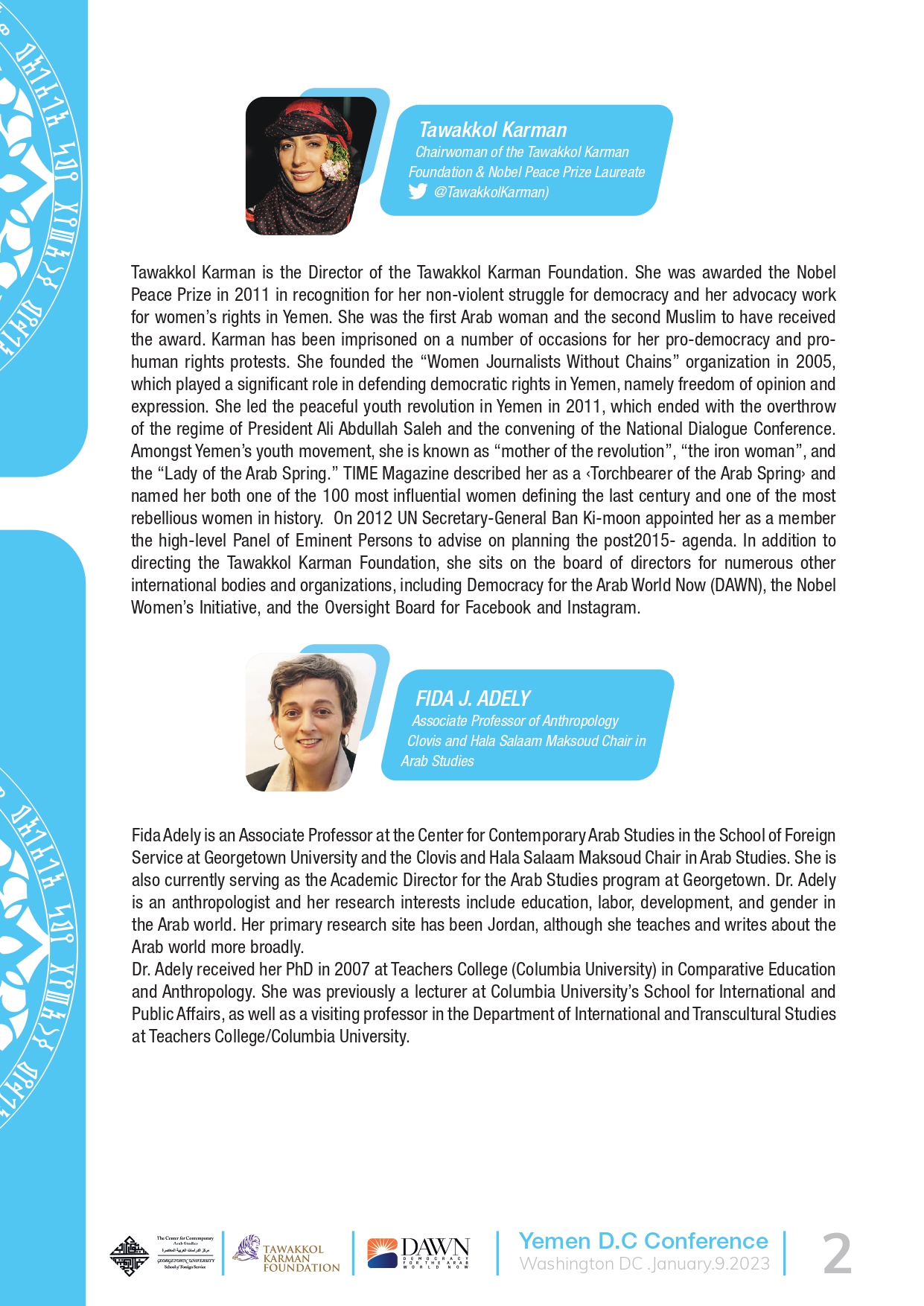
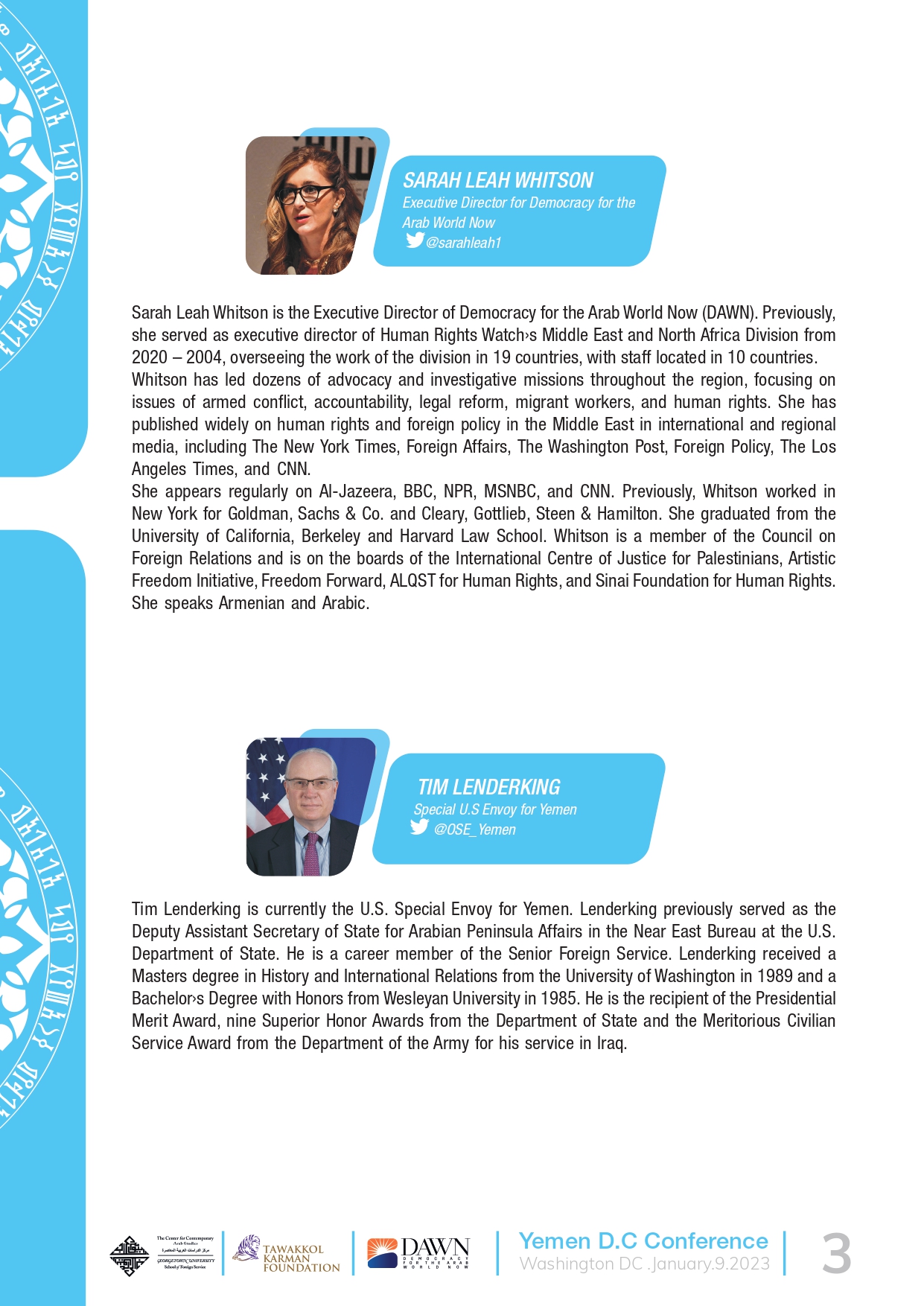
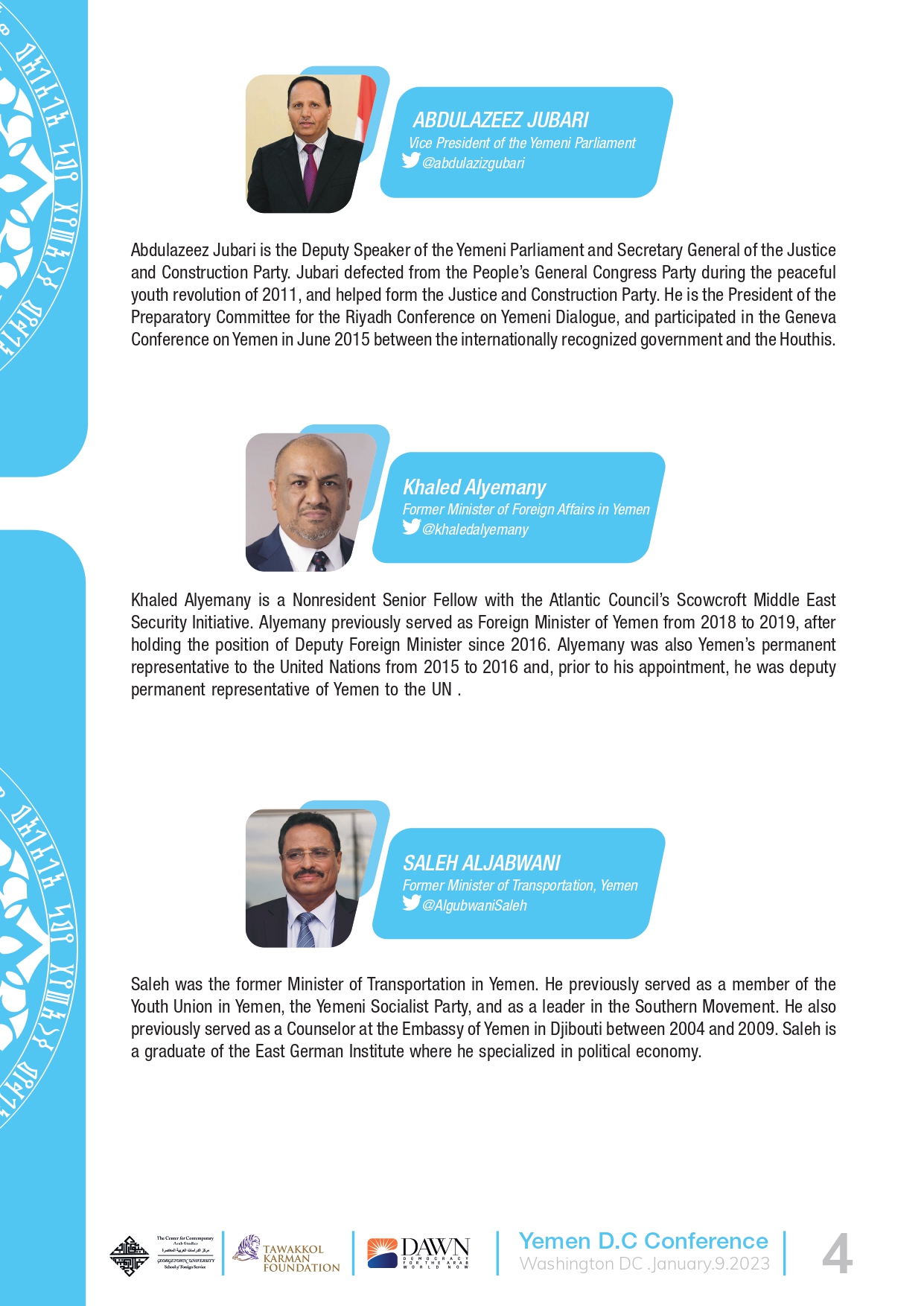
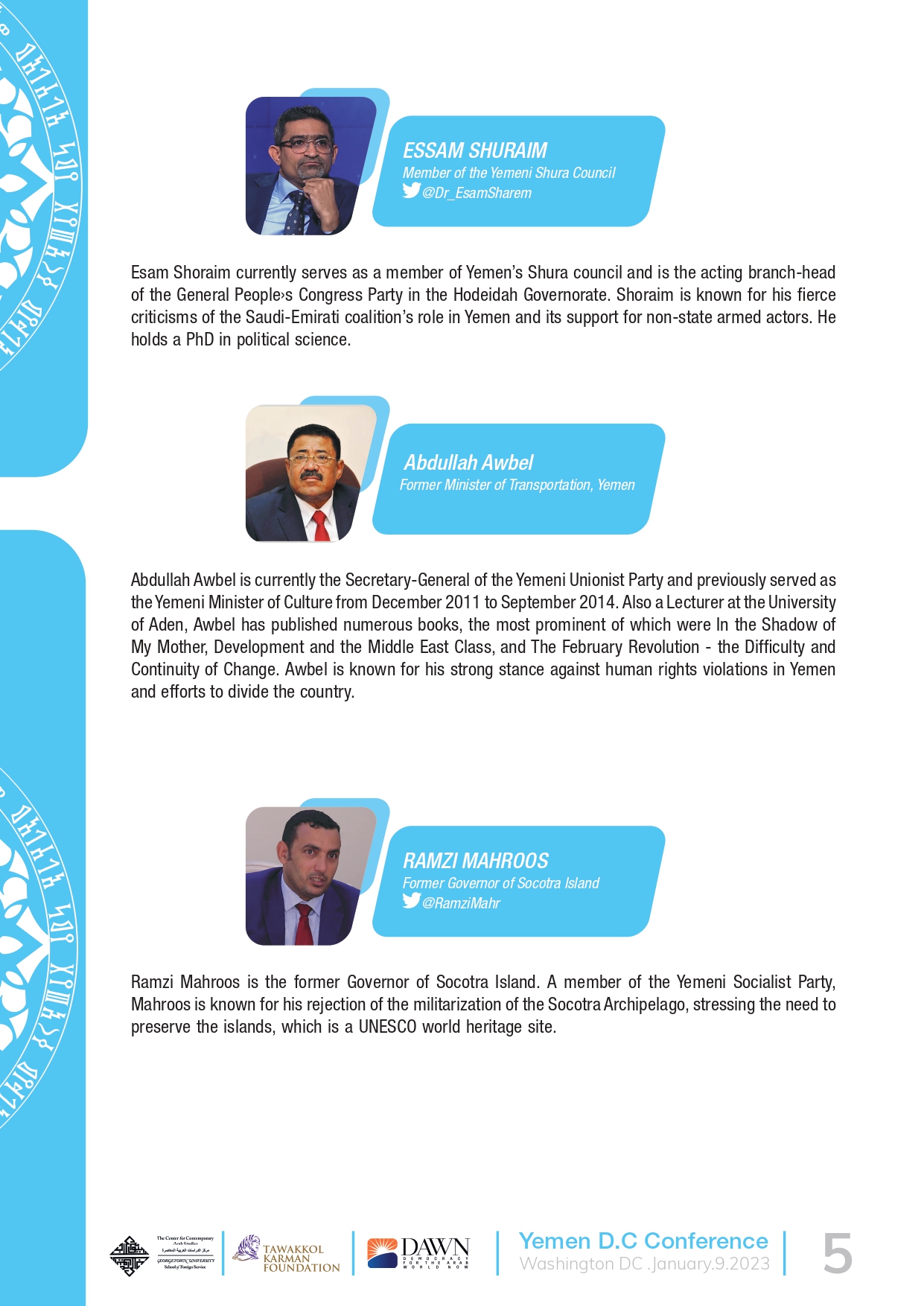
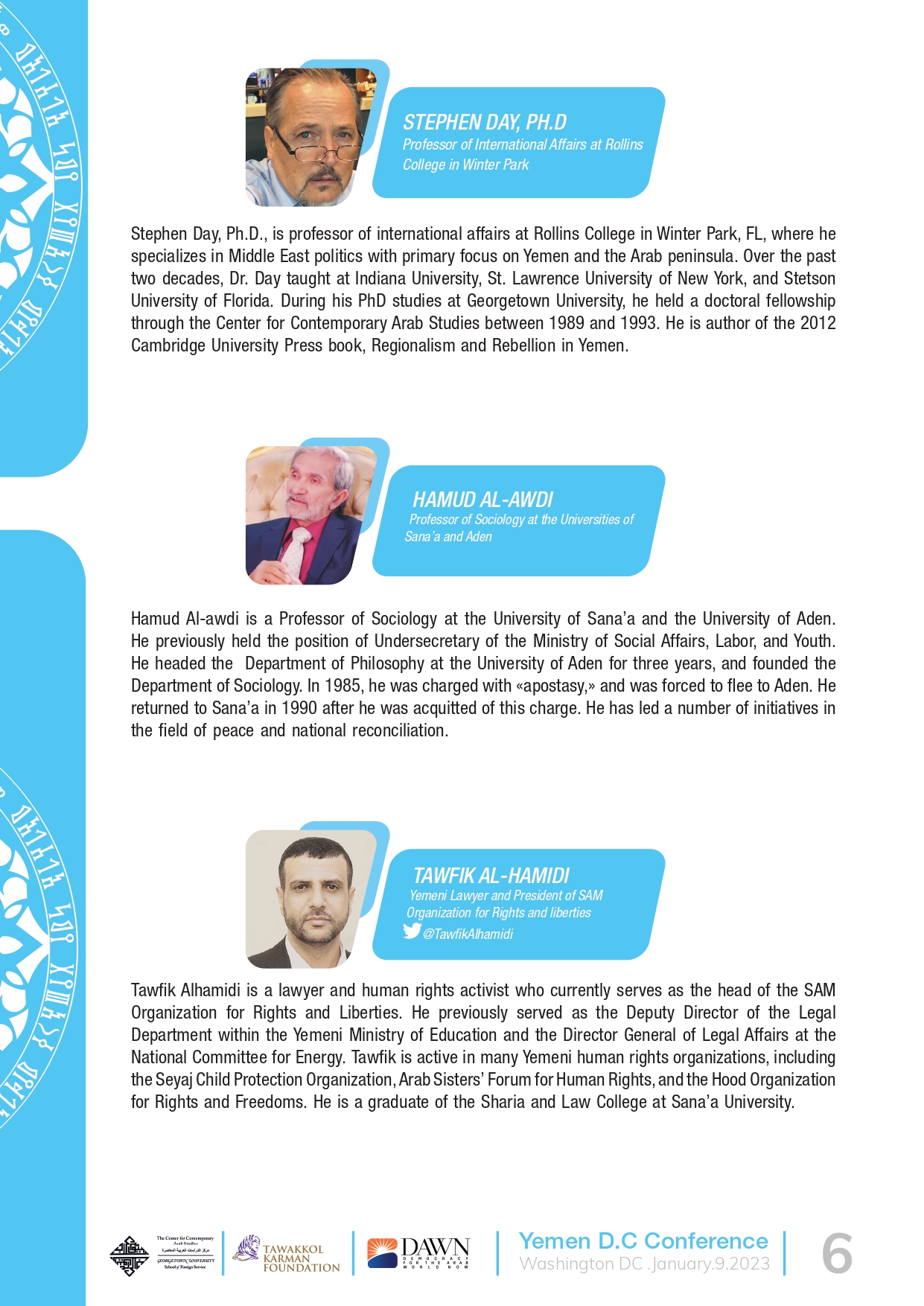
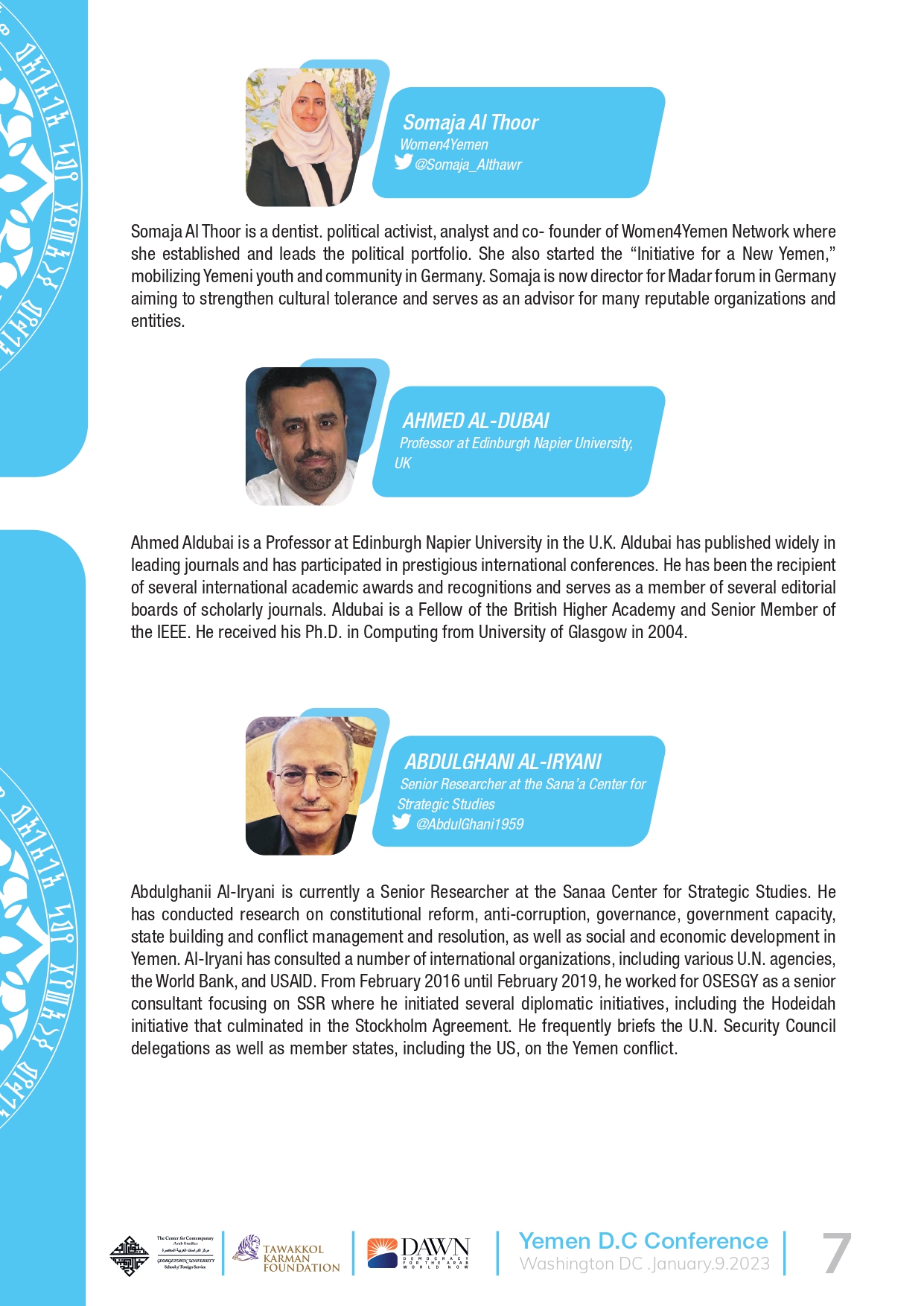
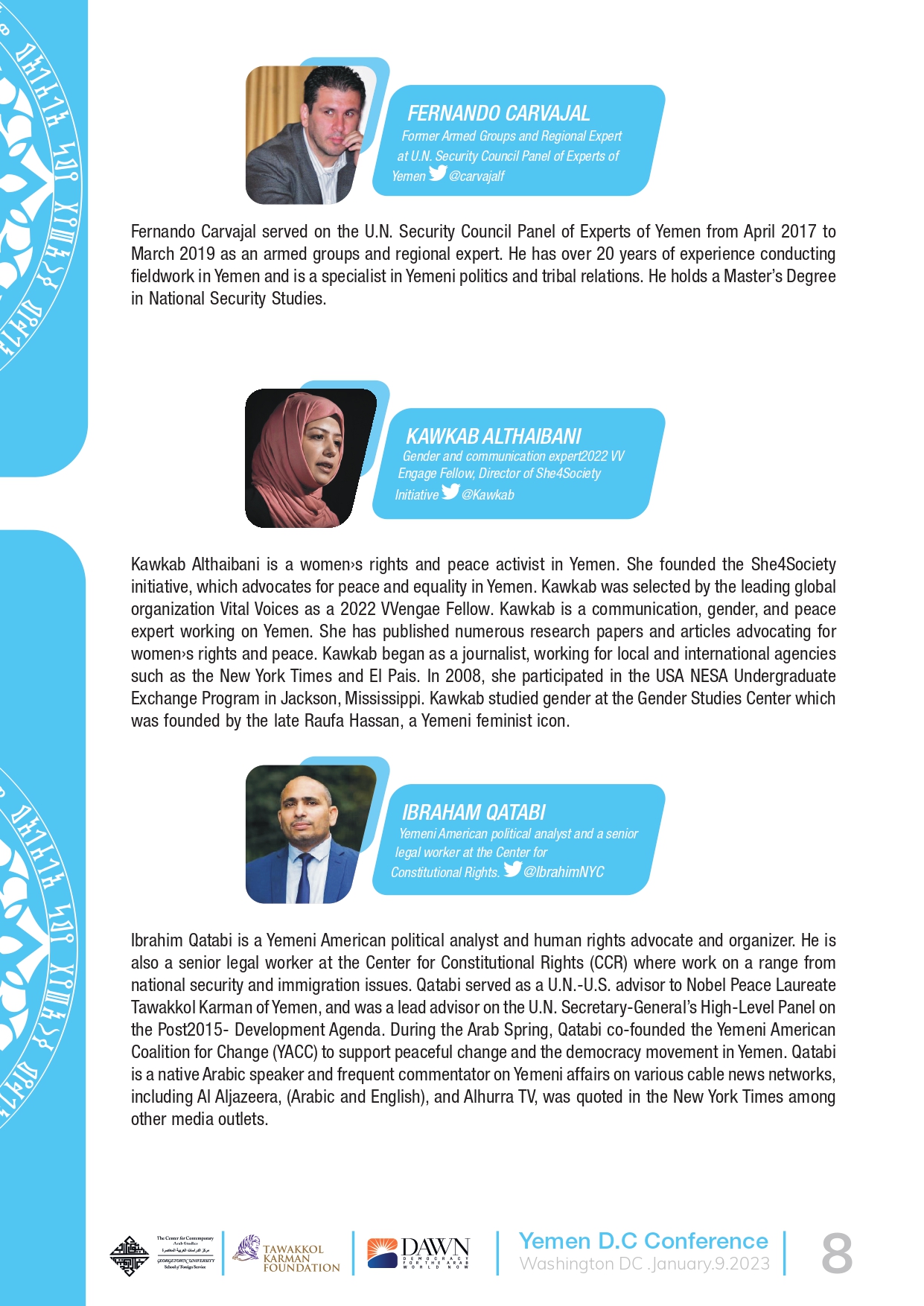
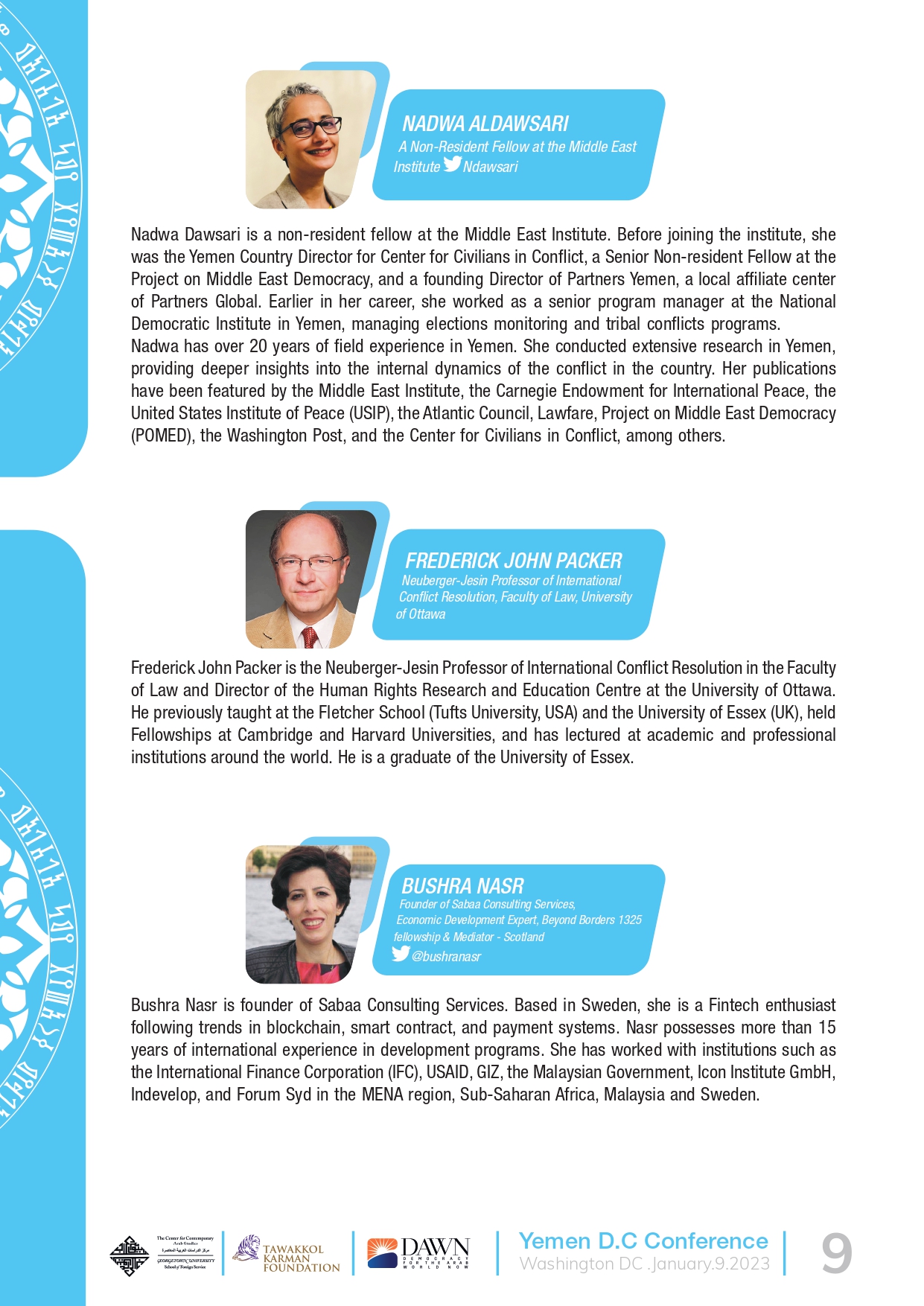
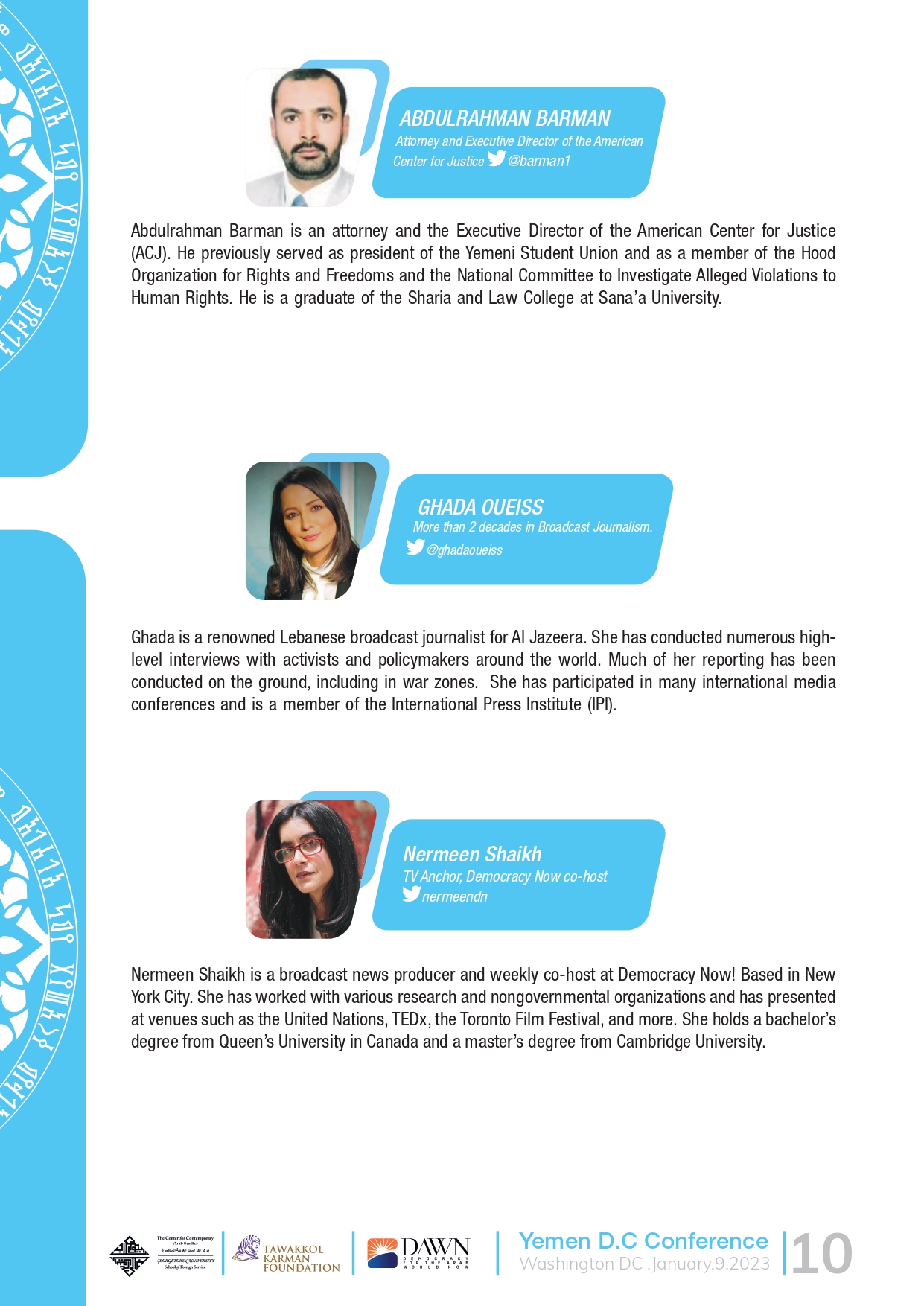
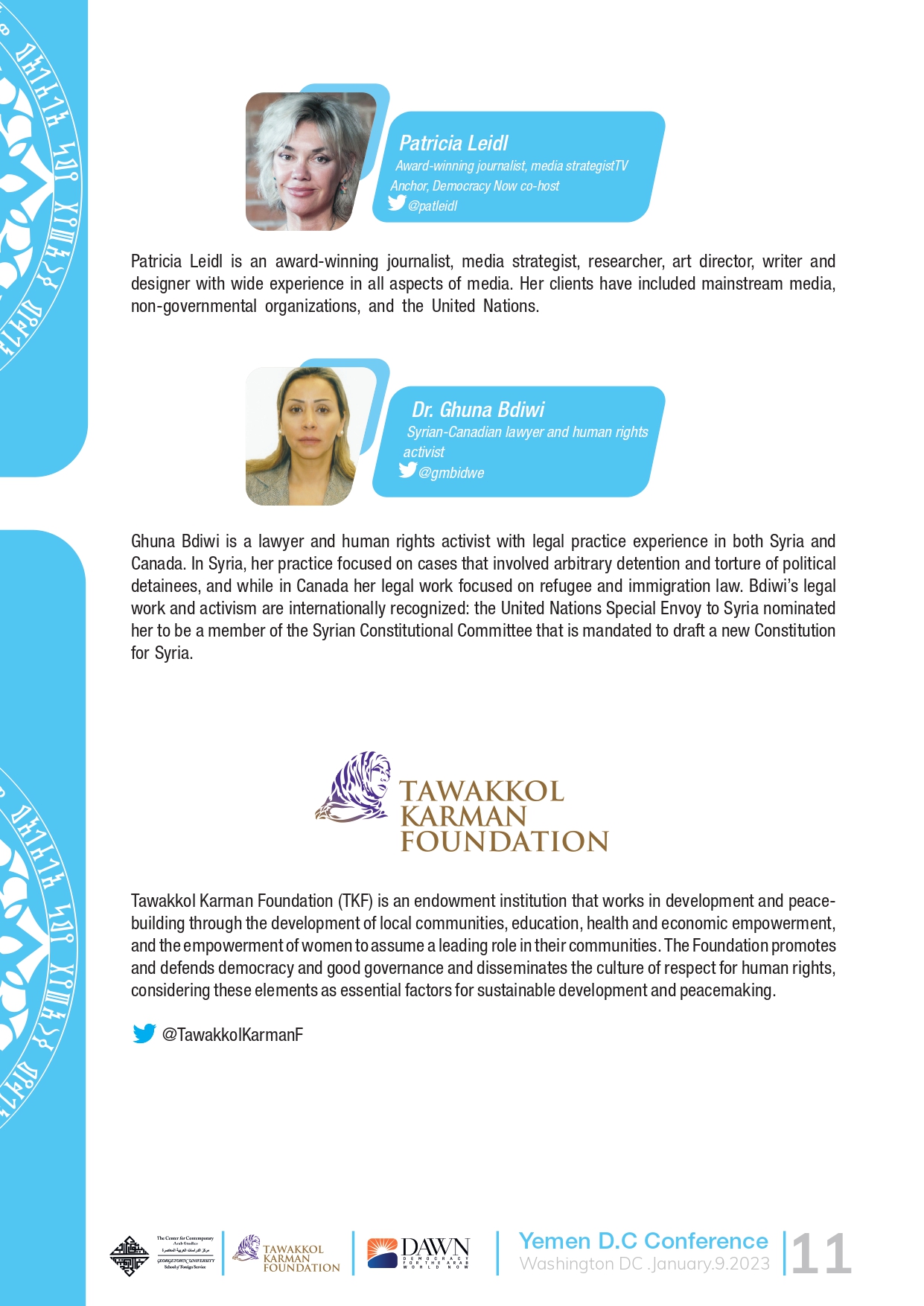
Conference Program
